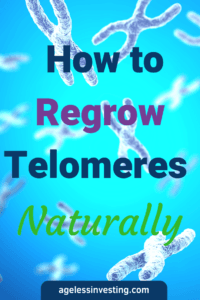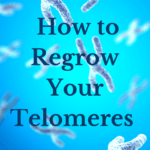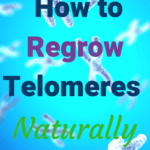Could the secret to slowing aging lie hidden at the very ends of our DNA?
Telomeres, the protective caps on our chromosomes, play a crucial role in cellular health and longevity. While shorter telomeres are associated with aging and disease, the science suggests there might be ways to protect and perhaps even lengthen them naturally.
This article explores what telomeres are, how they function, and discusses 7 potential natural remedies and lifestyle approaches often linked to telomere health, based on current research.
Discover strategies involving diet, exercise, stress management, and more that could contribute to healthier aging at a cellular level. *(Please see important health disclaimer below)*.

What Are Telomeres?
Telomeres are the caps at the end of each chromosome strand that protect your DNA from unraveling or fraying. Chromosomes are double-stranded, thread-like structures at the end of DNA strands containing all your genetic information.
You’re constantly gaining and losing cells. Telomeres protect your chromosomes during cell division. But they shorten during each cell division.
Eventually, telomeres are too short to protect your chromosomes, leaving them vulnerable to decay. The cell stops dividing, becomes senescent, or dies through apoptosis or programmed cell death.
Because telomere shortening is associated with aging and cancer, telomeres are compared to a bomb fuse.
Theoretically, if you slow telomere shortening, you can slow the aging process.
Telomere Function and Structure
Telomeres allow your cells to divide. Cell division is necessary to grow new cells and stay alive without losing genetic information. Otherwise, your chromosome ends would fuse and damage your cell’s genetic code, leading to breakdown, cancer, or cell death.
Your cells can recognize and repair chromosome damage. Without telomeres, your cells would try to fix what looks like damaged DNA, whether broken or not. This continual repair process would keep cells from dividing. And ultimately dying.
Telomeres are DNA sequences made of four nucleic acid bases: thymine (T), adenine (A), guanine (G), and cytosine (C). On one strand, they’re repeating sequences of TTAGGG, paired with AATCCC on the other (Ref. 1).
Each section of a telomere is a repeat made of six base pairs. Each chromosome has about 150 million base pairs. Every time a cell divides, it loses about 30 to 200 base pairs from its telomeres.
The telomere length of white blood cells starts at about 8,000 base pairs in newborns, 3,000 base pairs in adults, and 1,500 in the elderly. Cells generally divide about 50 to 70 times. With each cell division, telomeres become progressively shorter until the cell becomes senescent or dies.
Why do telomeres Shorten each time a cell divides?
Before a cell divides, it must make copies of its chromosomes for each new cell to have identical DNA (Ref. 1). For replication, the two DNA strands of a chromosome must unravel and separate.
Then, an enzyme called DNA polymerase reads the original strands to replicate two new strands. The process requires adding short pieces of RNA at the end of each new strand. However, each strand is a little shorter than the original because of the space needed at the end of the RNA.
What can you do to protect or even lengthen your telomeres?
7 Natural Ways to Support Telomere Health
Research suggests lifestyle choices play a significant role in telomere maintenance. Here are potential approaches:

1. Exercise Regularly
Studies show that the more physically active you are, the longer your telomeres tend to be.
One study of 5,823 adults compared leukocyte telomere length between three groups: physically active, moderately active, and sedentary (Ref. 2). Leukocytes are an important class of immune cells. The study controlled for multiple demographics and lifestyle variables that may affect the relationship between physical activity and telomere length.
The High-activity group had a biological age advantage of about nine years compared to the Sedentary group, 8.8 years compared to the Low-activity group, and about 7.1 years compared to the Moderate Group.
What about the telomeres of marathon runners?
One study found that marathon runners and triathletes in their fifties had the chromosomes and telomeres of twenty-year-olds (Ref. 3). These athletes ran about 50 miles a week for about 35 years.
If having longer telomeres can help moderate the aging process, then exercise is an effective anti-aging tool available to almost everyone.

2. Eat Foods Associated with Longer Telomeres
Studies suggest diet is possibly more critical for telomere length than exercise. What foods might help telomeres?
One study of 400 women found that those placed on a plant-based diet for three months had significantly longer telomeres than the control group during the same period (Ref. 4). How does a plant-based diet protect your telomeres?
Plant-based diets are naturally low in saturated fat, which has been associated with shorter telomeres. For example, replacing just one percent of your daily calories from saturated fat with other sources was linked to telomere length equivalent to about a year less of aging in one study (Ref. 4, though causality is complex). Why might saturated fat be detrimental?
Palmitic acid, the main saturated fat in meat and dairy, can potentially be toxic to cells in high amounts.

3. Avoid Foods Associated with Shorter Telomeres
Diets high in processed foods, particularly processed meats, and potentially red meat, are linked to shorter telomeres, possibly due to increased oxidative stress and inflammation (Ref. 5). One study associated higher processed meat intake with significant apparent DNA aging based on telomere length (Ref. 5).
Focusing on whole, unprocessed plant foods minimizes exposure to these potentially damaging components.
Telomere-Safe Omega-3s: While fish contain Omega-3s, concerns exist regarding heavy metals and saturated fat content. Fish obtain Omega-3s from algae. Plant-based sources like algae oil (for DHA/EPA) and ground flax or chia seeds (for ALA) offer Omega-3s without these potential downsides.
4. Support Telomerase Naturally
Your body has an enzyme called telomerase that helps maintain telomeres by adding back some of the lost DNA sequences (Ref. 1). While its activity decreases in most cells over time, it remains active in certain cells, like reproductive cells.
How can you support your natural telomerase activity?
A study funded by the U.S. Department of Defense found that three months of comprehensive lifestyle changes (whole food plant-based diet, moderate exercise, stress management) significantly boosted telomerase activity in participants (Ref. 6).
Learn more about boosting telomerase activity in this video:
Be cautious of supplements marketed with claims to increase telomerase activity; focus on natural lifestyle approaches and discuss supplements with your doctor.
5. Reduce or Manage Chronic Stress
Stress shortens telomeres and accelerates aging. Studies show caregivers under chronic stress or individuals with severe work exhaustion can have telomeres indicating biological aging up to a decade faster than low-stress counterparts (Ref. 7, 8).
Even *perceived* stress matters. Women reporting the highest stress levels had significantly shorter telomeres (Ref. 9). Traumatic childhood events can also have lasting negative effects on telomere length into adulthood (Ref. 10).
Managing stress effectively is therefore crucial for protecting telomeres.

6. Practice Meditation
Meditation helps manage stress perception by fostering self-awareness and emotional regulation. Studies show it can positively impact telomere health. Caregivers practicing meditation (12 minutes daily for 8 weeks) showed significantly increased telomerase activity and improved mental/physiological function compared to controls (Ref. 11).
Schedule time for mindfulness or meditation. Even a few minutes daily can help calm your mind and support well-being.
7. Minimize Environmental Toxin Exposure
Certain environmental factors can negatively impact telomeres:
- Smoking: A major factor in accelerating telomere shortening.
- Poor Sleep: Chronic lack of quality sleep acts as a stressor.
- Air Pollution: Linked to shorter telomeres, even in newborns (Ref. 12).
- Other Toxins: Minimize exposure to known environmental toxins where possible.
- *(Note: Original source mentioned childbirth link (Ref 13); this is complex and potentially related to stress/resource allocation rather than a direct toxin).*
Diseases Related to Telomere Length
Telomere length represents a complex balance. Abnormally short telomeres are linked to increased risk for many chronic diseases, while abnormally long ones might increase certain cancer risks.
Diseases Associated with Short Telomeres
- Cardiomyopathy (heart disease) (Ref. 14)
- Muscular dystrophy (due to impaired stem cell regeneration) (Ref. 15)
- Type 2 Diabetes (potentially linked to DNA damage from shortening) (Ref. 16)
- Osteoporosis (Ref. 17)
- Certain bone marrow failures (Ref. 18)
- Increased mortality from heart disease (Ref. 19)
- Pulmonary fibrosis (Ref. 20)
Potential Risks Associated with Abnormally Long Telomeres
- May allow cancer cells to become immortal, hindering treatment (Ref. 21, 22).
- Genetic predisposition to very long telomeres linked to increased risk for certain cancers (Ref. 23).
- Extreme length might lead to “telomeric fragility” and mutations (Ref. 25).
The focus should be on maintaining healthy, functional telomere length through lifestyle, not artificial lengthening.
Can Telomeres Regenerate Naturally?
Yes, the body has repair mechanisms. Research highlights the RNA molecule TERRA, which helps repair critically short telomeres, allowing healthy cell division to continue (Ref. 24). Natural regulatory processes (involving proteins like XRCC3 and Nbs1) seem to prevent excessive lengthening (Ref. 25), maintaining a balance.
What About Vitamins and Supplements for Telomeres?
Some research suggests certain nutrients support telomere health:
- B Vitamins: May help preserve length by lowering homocysteine (Ref. 26).
- Vitamin D: May support telomerase activity (Ref. 26 context).
- Vitamins C & E: Antioxidants reducing chemical stress (Ref. 26).
- Other Nutrients: Gamma-tocotrienol and lutein also linked to telomere health (Ref. 27).
A well-rounded, nutrient-dense diet is the best foundation. Discuss any targeted supplementation with a healthcare professional.
Conclusion: Nurturing Your Cellular Health for Longevity
Telomere length offers a fascinating window into cellular aging. While we can’t turn back the clock indefinitely, evidence suggests lifestyle choices significantly influence how quickly our telomeres shorten.
Focusing on a holistic approach—regular exercise, a diet rich in whole plant foods, effective stress management like meditation, quality sleep, and minimizing toxin exposure—provides the best environment for maintaining healthy telomeres and supporting overall longevity. Rather than seeking quick fixes, prioritize building a foundation for thriving.
Important Health Disclaimer
This article discusses complex biological concepts for informational purposes only and does not constitute medical advice. Telomere science is rapidly evolving. Always consult with qualified healthcare professionals regarding your health concerns, diagnoses, treatments, and before making any significant changes to your lifestyle or considering supplements.
Read the full medical disclaimer here.
Sources Cited
- Learn.Genetics, University of Utah. (Date Accessed). Telomeres. Link
- Tucker, L. A. (2017). Physical activity and telomere length… *Preventive medicine*, 100, 145–151. Link
- Werner, C., Fürster, T., Widmann, T., et al. (2009). Physical exercise prevents cellular senescence… *Circulation*, 120(24), 2438–2447. Link (*Note: Link may require access*)
- Shalev, I., et al. (2013). Stress and telomere biology… *Psychoneuroendocrinology*, 38(9), 1835-42. Link (*Note: Link abstract differs*)
- Nettleton, J. A., Diez-Roux, A., Jenny, N. S., et al. (2008). Dietary patterns…and telomere length… *The American journal of clinical nutrition*, 88(5), 1405–1412. Link
- Ornish, D., Lin, J., Chan, J. M., et al. (2008). Increased telomerase activity and comprehensive lifestyle changes… *The Lancet. Oncology*, 9(11), 1048–1057. Link (*Note: Link may require access*)
- Epel, E. S., Blackburn, E. H., Lin, J., et al. (2004). Accelerated telomere shortening in response to life stress. *PNAS*, 101(49), 17312–17315. Link
- Ahola, K., Sirén, I., Kivimäki, M., et al. (2012). Work-related exhaustion and telomere length… *PloS one*, 7(7), e40186. Link
- (Duplicate Ref 7) Epel, E. S., Blackburn, E. H., Lin, J., et al. (2004). Accelerated telomere shortening… *PNAS*, 101(49), 17312–17315. Link
- Mitchell, C., Hobcraft, J., McLanahan, S. S., et al. (2014). Social disadvantage, stress, and health behaviors… *PNAS*, 111(17), 6277–6282. Link (*Note: Link may be broken/incorrect*)
- Lavretsky, H., Epel, E. S., Siddarth, P., et al. (2013). A pilot study of yogic meditation for family dementia caregivers… *International journal of geriatric psychiatry*, 28(1), 57–65. Link
- ScienceDaily. (2018, January 24). Air pollution exposure in the womb linked to shorter telomeres. Link
- Pollack, A. Z., Rivers, K., & Ahrens, K. A. (2018). Parity associated with telomere length… *Human reproduction*, 33(4), 736–743. Link
- ScienceDaily. (2018, August 27). Telomere shortening triggers human heart disease. Link
- ScienceDaily. (2017, September 7). Telomere shortening impairs regeneration of muscle stem cells. Link
- Zee, R. Y., Castonguay, A. J., Barton, N. S., et al. (2004). Mean leukocyte telomere length shortening in isolating systolic hypertension… *Hypertension*, 44(3), 309–312. Link (*Note: Link abstract differs*)
- Valdes, A. M., Andrew, T., Gardner, J. P., et al. (2007). Obesity, cigarette smoking, and telomere length… *The Lancet*, 369(9562), 667–679. Link (*Note: Link abstract differs*)
- ScienceDaily. (2018, February 26). Telomere length can predict outcome in bone marrow failure. Link
- Cawthon, R. M., Smith, K. R., O’Brien, E., et al. (2003). Association between telomere length in blood and mortality… *The Lancet*, 361(9355), 393–395. Link
- ScienceDaily. (2015, July 2). Telomeres identified as the origin of pulmonary fibrosis. Link
- ScienceDaily. (2018, March 21). Extremely long telomeres promote cancer development. Link
- ScienceDaily. (2015, April 10). Telomere length linked to cancer risk. Link
- ScienceDaily. (2017, April 3). Long telomeres linked to increased risk for cancer. Link
- ScienceDaily. (2017, June 30). How short telomeres are repaired. Link
- Fight Aging! (2016, December). Long Telomeres May Also Be Problematic. Link
- Life Extension Magazine. (2016, December). Research Update. Link
- InsideTracker Blog. (Date Accessed). Strategies to Slow Telomere Reduction. Link



This is such an interesting article. I was really surprised about the idea that eating fish is working against you in this instance. I’m curious to do more research on this. Thank you for introducing me to the idea of Telomeres.
Thank you, I will write more about fish in future posts. From what I’ve learned, besides being harmful to telomeres, fish are highly contaminated with toxins and heavy metals. Nevertheless, I will find the safest source for those who love fish. But one of the main benefits of fish, the omega-3 DHA, is available in algae oil. Interestingly, fish get their omega-3s from algae! I will update my post with a link to the algae oil I use to replace fish for anyone who is interested.
I think someone pulled this information out of their ass !!! We need fats and lots of it . Plants have tons of microtoxins in it . Big pharma really pushing plant based diet . Fats and meats heal .
Thank you for your feedback! I try my best to keep an open mind. I enjoy listening to both sides of the argument. Scientific studies can be wrong or manipulated. When in doubt look at what the longest living people in the world eat. Some of the Blue Zones eat meat and fish occasionally while others don’t eat any animal products at all.
I wouldn’t be quick to give up fish or eggs, both excellent sources for protein, especially eggs. As for the toxicity in fish, toxins can be chelated (flushed) by a number of means, one of which is DMSA http://warddeanmd.com/dmsa-and-detoxing-heavy-metals/. Moreover, I would not give up meat, either. Just eat a balanced diet of whole foods with lots of protein, good fats, and good carbs. And, in addition to the aforementioned, if you don’t smoke anything, don’t take drugs, and don’t roller skate in a buffalo herd, you just might enjoy a long and healthful life
Pingback: 10 Habits Satisfying_New Version_5A
Pingback: See it B4 Archiving_10 Habits
Man, I came here for some real information. Not a vegan propaganda piece.
Thank you for sharing your opinion, XP. You’re right that I recommend a vegan diet in my article. But not because I have an agenda, other than I want people to live a long and healthy life. My recommendation is based on scientific research, common sense, and experience. Being vegan is not the point. You can still harm your telomeres on a junk food vegan diet. The longest living people in the world eat a whole-food plant-based diet with meat on special occasions. And what is the best diet for your telomeres according to research? A mostly whole-food plant-based diet. I share the truth and don’t hold back so that people can decide what’s best for themselves. If I’m wrong I want to learn and share the truth. Please feel free to read other telomere articles as I do frequently.
Characterizing fish as toxic is just plain wrong. You can control what kind of fish you eat. The amount of heavy metal toxins in wild salmon for instance has never been shown to be harmful. There are some fish species you should avoid eating on a regular basis such as shark.
Thank you for your opinion. I said “fish” because the scientific article didn’t specify which ones. You’re right that some fish are less toxic than others and fish can be part of a healthy diet. My point is that “fish” can be harmful to your telomeres, which are associated with diseases and aging. That’s good to know about sharks. But if you don’t agree with something, please cite your sources. Don’t just tell me that I am wrong.
Very interesting. How about yogurt, fat-free or other? What does that do?
Another lefty anti-human article. Don’t have babies because it shortens your telomeres. Ignore this God-less hack who wrote this and have lots of kids and create a loving home! Children bring lifelong joy that can’t be replaced
Thank you for your feedback. I only used mothers having children as an example of stress and telomere shortening. I never said not to have children or care for them. Yes, children need a loving home. I am in no way a leftist, as I oppose leftist principles. The only thing I like is eating a plant-based diet, not for political reasons, but for my health. I don’t think people should be forced to eat that way, but they should be able to learn about the benefits. I have no patience for anti-humanism or being accused of it. I believe and free speech, so I’ve allowed your comments. But please no judging on my blog.
Great work there. I am a PhD student, and my research interest focuses on telomere and telomerase dynamics in infectious diseases in the natural population of Cameroon and Nigeria. I’m hoping to get a good lab to conduct my research.